Fleurs du Mal Magazine


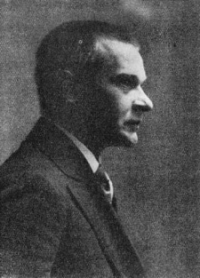
Grodek
Am Abend tönen die herbstlichen Wälder
von tödlichen Waffen, die goldnen Ebenen
und blauen Seen, darüber die Sonne
düstrer hinrollt; umfängt die Nacht
sterbende Krieger, die wilde Klage
ihrer zerbrochenen Münder.
Doch stille sammelt im Weidengrund
rotes Gewölk, darin ein zürnender Gott wohnt
das vergoßne Blut sich, mondne Kühle;
alle Straßen münden in schwarze Verwesung.
Unter goldenem Gezweig der Nacht und Sternen
es schwankt der Schwester Schatten durch den schweigenden Hain,
zu grüßen die Geister der Helden, die blutenden Häupter;
und leise tönen im Rohr die dunkeln Flöten des Herbstes.
O stolzere Trauer! ihr ehernen Altäre
die heiße Flamme des Geistes nährt heute ein gewaltiger Schmerz,
die ungebornen Enkel.
Georg Trakl
(1887 – 1914)
Grodek
• fleursdumal.nl magazine
More in: Archive S-T, Archive S-T, Trakl, Georg, Trakl, Georg
Les treize histoires et sept poèmes qui composent ce livre se répondent et se complètent:
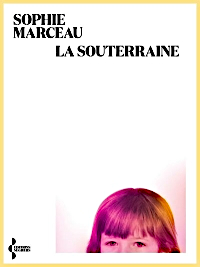
Au fil des récits, des fables, des fragments de vie, des poésies, il s’agit toujours de dévoiler un mystère, un secret, la part souterraine…
Les mots s’insinuent comme il faut pour toucher ce qu’il y a à toucher, et dire ce qu’il y a à en dire. Avec finesse et intensité.
Et c’est un plaisir de plonger dans ces textes – débordants d’imagination, de fantaisie, basculant souvent de l’observation la plus juste à une imprévisible drôlerie.
Sophie Marceau: actrice, réalisatrice et scénariste, elle publie avec La Souterraine son deuxième livre après Menteuse (Stock, 1996).
Sophie Marceau (Auteur)
La Souterraine
Cinéma, littérature et poésie
Editeur Seghers
Paru le 4 mai 2023
Format: broché
EAN 9782232146831
ISBN 2232146839
SKU 5292114
Nombre de pages 160
Format 14cm x 19cm
€ 17,00
• fleursdumal.nl magazine
More in: #Editors Choice Archiv, - Book News, - Bookstores, Archive M-N, Archive M-N, AUDIO, CINEMA, RADIO & TV, THEATRE
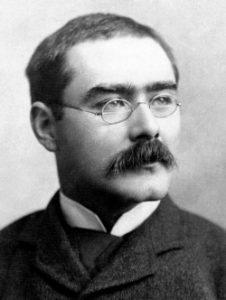
If—
If you can keep your head when all about you
Are losing theirs and blaming it on you,
If you can trust yourself when all men doubt you,
But make allowance for their doubting too;
If you can wait and not be tired by waiting,
Or being lied about, don’t deal in lies,
Or being hated, don’t give way to hating,
And yet don’t look too good, nor talk too wise:
If you can dream—and not make dreams your master;
If you can think—and not make thoughts your aim;
If you can meet with Triumph and Disaster
And treat those two impostors just the same;
If you can bear to hear the truth you’ve spoken
Twisted by knaves to make a trap for fools,
Or watch the things you gave your life to, broken,
And stoop and build ’em up with worn-out tools:
If you can make one heap of all your winnings
And risk it on one turn of pitch-and-toss,
And lose, and start again at your beginnings
And never breathe a word about your loss;
If you can force your heart and nerve and sinew
To serve your turn long after they are gone,
And so hold on when there is nothing in you
Except the Will which says to them: ‘Hold on!’
If you can talk with crowds and keep your virtue,
Or walk with Kings—nor lose the common touch,
If neither foes nor loving friends can hurt you,
If all men count with you, but none too much;
If you can fill the unforgiving minute
With sixty seconds’ worth of distance run,
Yours is the Earth and everything that’s in it,
And—which is more—you’ll be a Man, my son!
Rudyard Kipling
(1865 – 1936)
If
• fleursdumal.nl magazine
More in: Archive K-L, Archive K-L, Kipling, Rudyard
The only book of poetry to date devoted to the Rwanda genocide and published in this country, this is a work of nonfictional poetry, a cousin in genre to the nonfictional novel.
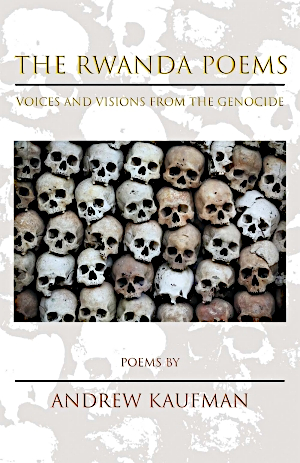 It is based not only on the poet’s observations and encounters during months spent in post-genocide Rwanda, but on his numerous extensive interviews with survivors, all of whom lost most if not all of their families, and with convicted genocide perpetrators, conducted in prisons.
It is based not only on the poet’s observations and encounters during months spent in post-genocide Rwanda, but on his numerous extensive interviews with survivors, all of whom lost most if not all of their families, and with convicted genocide perpetrators, conducted in prisons.
The result is a startling book of poems that by turns is unthinkably horrifying, heartbreaking, and enraging, yet which at times breaks unexpectedly into stunning revelatory moments of grace.
As a poetry of witness this book reveals what it is like to carry on with daily life in a society where nearly every adult male is either a genocide survivor or perpetrator, almost every woman either a survivor or the wife of a perpetrator, and where nearly every child at the time of the genocide witnessed multiple killings, often of immediate family members.
Ranging from free verse to stanzaic forms, this book by an NEA-award-winning poet uses tools and methods of poetry to distil each of its many varied voices to its essence, allowing those who are heard in these poems to speak for themselves, often in juxtapositions that lend the book the structure and tension of a drama. Considered more broadly, The Rwanda Poems is a book about the extremities of evil that the human psyche is capable of enduring and inflicting, and the resulting psychic costs to survivors and perpetrators.
Andrew Kaufman‘s books include Earth’s Ends, winner of the Pearl Poetry Prize, The Cinnamon Bay Sonnets, winner of the Center for Book Arts book award, Both Sides of the Niger (Spuyten Duyvil Press), and the COMPLETE CINNAMON BAY SONNETS (Rain Mountain Press). The time he spent in Rwanda was made possible in part by an NEA grant. He has taught literature and writing at a number of colleges and universities, and resides in New York City.
The Rwanda Poems
Voices and Visions from the Genocide
by Andrew Kaufman
Language: English
Publisher: NYQ Books
10 Mar. 2023
Product Number:9781630450816
ISBN-10: 1630450812
ISBN-13: 978-1630450816
Pages:110
Paperback
£12.13
• fleursdumal.nl magazine
More in: #Editors Choice Archiv, - Book News, - Bookstores, Archive K-L, Archive K-L
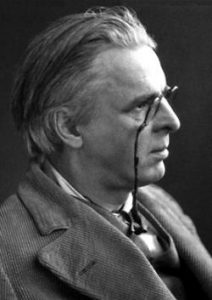
An Image from a Past Life
He. Never until this night have I been stirred.
The elaborate star-light throws a reflection
On the dark stream,
Till all the eddies gleam;
And thereupon there comes that scream
From terrified, invisible beast or bird:
Image of poignant recollection.
She. An image of my heart that is smitten through
Out of all likelihood, or reason,
And when at last,
Youth’s bitterness being past,
I had thought that all my days were cast
Amid most lovely places; smitten as though
It had not learned its lesson.
He. Why have you laid your hands upon my eyes?
What can have suddenly alarmed you
Whereon ’twere best
My eyes should never rest?
What is there but the slowly fading west,
The river imaging the flashing skies,
All that to this moment charmed you?
She. A sweetheart from another life floats there
As though she had been forced to linger
From vague distress
Or arrogant loveliness,
Merely to loosen out a tress
Among the starry eddies of her hair
Upon the paleness of a finger.
He. But why should you grow suddenly afraid
And start — I at your shoulder —
Imagining
That any night could bring
An image up, or anything
Even to eyes that beauty had driven mad,
But images to make me fonder?
She. Now she has thrown her arms above her head;
Whether she threw them up to flout me,
Or but to find,
Now that no fingers bind,
That her hair streams upon the wind,
I do not know, that know I am afraid
Of the hovering thing night brought me.
William Butler Yeats
(1865-1939)
An Image from a Past Life
• fleursdumal.nl magazine
More in: Archive Y-Z, Archive Y-Z, Yeats, William Butler
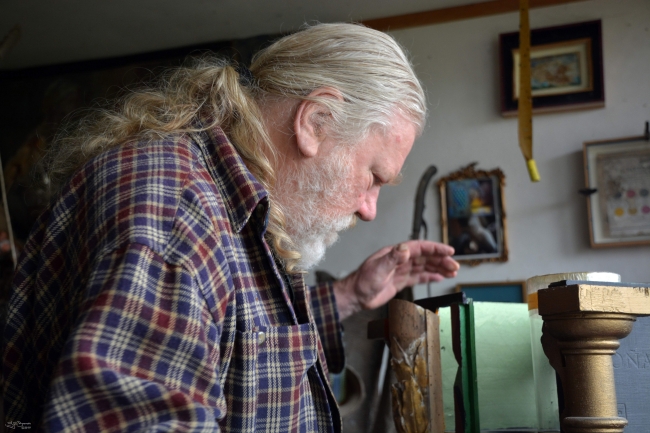
tentoonstelling
WIJNAND VAN LIESHOUT
‘L’ ÉROTIQUE DU REGARD’
‘Metropolitan Museum Tilburg’ – Stedekestraat 15 – 5041 DM Tilburg
vrijdag 5 mei t/m zondag 25 juni 2023
Wijnand van Lieshout, de nestor van de Tilburgse kunstwereld (83 jaar), is nog iedere nacht actief in zijn met relieken overladen appartement in Tilburg Noord. Hij kan het niet laten. Daar op dat flatje zes hoog ontstaat in het donker zijn magistrale werk. Raadselachtige en onnavolgbare werelden die verwijzen naar een ondermaanse ruimte, een onbekend universum dat zich bij iedere aanblik opnieuw ontsluit. Men kan er uren in verdwalen. Voer voor ieder nieuwsgierig oog, voor een gevoelige, haast zintuigelijke waarneming, l’Érotique du Regard.
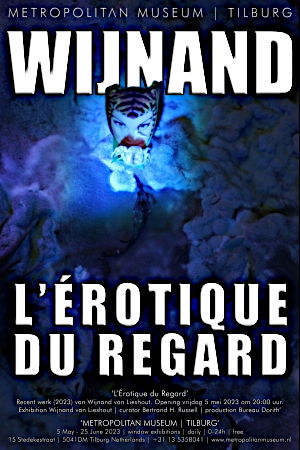 Dit moet u zien, dit mag u niet ontgaan.
Dit moet u zien, dit mag u niet ontgaan.
Deze eenmalige tentoonstelling in het ‘Metropolitan Museum’ aan de Stedekestraat in Tilburg toont tien wonderbaarlijke werken die de afgelopen maanden tot stand kwamen. Vers van de pers.
Romantische mijmeringen naar een vervlogen verleden dat wellicht nooit heeft bestaan.
Werken die voortvloeien uit vrijwel niets, uit een paar haren, wat half vergane lappen, stukjes uitgedroogde planten, resten van dode dieren, magisch licht, de mossels niet te vergeten, en bovenal stof, stof en nog eens stof. Blijkbaar kan dat.
Van Lieshout mag dan wel een spraakwaterval zijn waar geen speld tussen te krijgen is, maar als het op kijken aankomt is hij nauwelijks te evenaren. Zelden zal men iemand ontmoeten die zo geconcentreerd kan kijken en allerlei dingen ziet die voor ons tot een verborgen rijk behoren, de meest fantastische voorstellingen in een hoop alledaags stof.
De Kunst van het Kijken in optima forma, de gave van het onbevangen ontdekken. Dat is aan zijn werk af te lezen. Aan u de gelegenheid om het te komen zien, om u te laten verleiden door zijn onvergetelijke werk.
‘L’Érotique du Regard’
Wijnand van Lieshout
5 mei t/m 25 juni 2023
dagelijks, dag en nacht, toegang vrij‘
Metropolitan Museum – Tilburg’
Stedekestraat 15 – 5041DM Tilburg
telefoon: 013 5358041 / 06 20325030
email: post@metropolitanmuseum.nl
website: www.metropolitanmuseum.nl
portretfoto: sjon brands
• fleursdumal.nl magazine
More in: - Objets Trouvés (Ready-Mades), Archive K-L, Art & Literature News, Exhibition Archive, Metropolitan Museum Tilburg, Sjon Brands, Wijnand van Lieshout
major exhibition devoted to
the radical Rossetti generation
in Tate Britain
from 6 April until 24 September 2023
This exhibition follows the romance and radicalism of the Rossetti generation, through and beyond the Pre-Raphaelite years: Dante Gabriel, Christina and Elizabeth (née Siddal). Visitors will get to experience world-renowned works from their boundary-pushing careers.
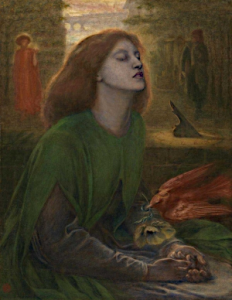 The Rossettis’ approach to art, love and lifestyles are considered revolutionary, and this will be thoroughly explored in an immersive show, using spoken poetry, drawings, paintings, photography, design and more.
The Rossettis’ approach to art, love and lifestyles are considered revolutionary, and this will be thoroughly explored in an immersive show, using spoken poetry, drawings, paintings, photography, design and more.
This is the first retrospective of Dante Gabriel Rossetti at Tate and the largest exhibition of his iconic pictures in two decades.
It will also be the most comprehensive exhibition of Elizabeth Siddal’s work for 30 years, featuring rare surviving watercolours and important drawings.
The Rossettis will take a fresh look at the fascinating myths surrounding the unconventional relationships between Dante Gabriel Rossetti, Elizabeth Siddal, Fanny Cornforth and Jane Morris.
The Rossettis exhibition book
by Carol Jacobi and James Finch
hardback
Dimensions 27.5 x 23 cm
Material FSC certified paper and card
ISBN 9781849768412
£40
This visually captivating hardback exhibition book is devoted to the radical Rossetti generation.
Explore the Rossettis’ revolutionary approach to art, love and lifestyles through a collection of thematic essays containing fresh and surprising research, accompanied by beautiful Pre-Raphaelite illustrations.
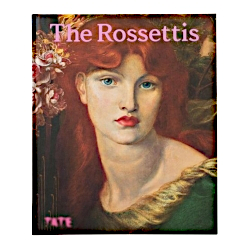 The Rossettis takes a fresh look at the fascinating myths surrounding the unconventional relationships between Dante Gabriel Rossetti, Elizabeth Siddal, Fanny Cornforth and Jane Morris. Featuring artworks and writings by Dante Gabriel, Christina and Elizabeth (née Siddal), the book distinguishes the Rossettis and foregrounds their countercultural roles.
The Rossettis takes a fresh look at the fascinating myths surrounding the unconventional relationships between Dante Gabriel Rossetti, Elizabeth Siddal, Fanny Cornforth and Jane Morris. Featuring artworks and writings by Dante Gabriel, Christina and Elizabeth (née Siddal), the book distinguishes the Rossettis and foregrounds their countercultural roles.
The catalogue accompanies the first retrospective of Dante Gabriel Rossetti at Tate and the largest exhibition of his iconic pictures in two decades, and what will also be the most comprehensive exhibition of Elizabeth Siddal’s work for 30 years, featuring rare surviving watercolours and important drawings.
The publication is edited by Carol Jacobi, Curator, British Art 1850—1915 at Tate and James Finch, Assistant Curator, Nineteenth Century Art at Tate. It features contributions by:
– Chiedza Mhondoro, Assistant Curator, Historic British Art at Tate – Dinah Roe, Reader in Nineteenth Century Literature at Oxford Brookes University – Glenda Youde, a writer and researcher based at University of York – Liz Prettejohn, Professor of Art History at University of York – Jan Marsh, a writer, curator and specialist in the Pre-Raphaelite period – Gursimran Oberoi, an associate teaching fellow at University of Surrey – Margaretta S. Frederick, the former Annette Woolard-Provine Curator of the Bancroft Collection of Pre-Raphaelite Art at Delaware Art Museum – Wendy Parkins, Professor of Victorian Literature and the Director of the Centre for Victorian Literature and Culture at the University of Kent
• fleursdumal.nl magazine
More in: *The Pre-Raphaelites Archive, - Book News, - Bookstores, Archive Q-R, Archive Q-R, Art & Literature News, Exhibition Archive, FDM in London, History of Britain, Illustrators, Illustration, Morris, William, Rossetti, Christina, Rossetti, Dante Gabriel, Siddal, Lizzy
Weaving Sundown in a Scarlet Light
Fifty Poems for Fifty Years
A magnificent selection of fifty poems to celebrate three-term US Poet Laureate Joy Harjo’s fifty years as a poet.
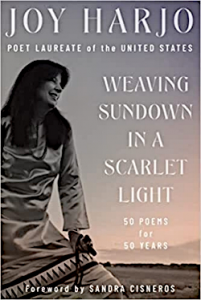 In this gemlike volume, Harjo selects her best poems from across fifty years, beginning with her early discoveries of her own voice and ending with moving reflections on our contemporary moment.
In this gemlike volume, Harjo selects her best poems from across fifty years, beginning with her early discoveries of her own voice and ending with moving reflections on our contemporary moment.
Weaving Sundown in a Scarlet Light traces every occasion of a lifetime; it offers poems on birth, death, love, and resistance; on motherhood and on losing a parent; on fresh beginnings amidst legacies of displacement.
Generous notes on each poem offer insight into Harjo’s inimitable poetics as she takes inspiration from sunrise and horse songs and jazz, reckons with home and loss, and listens to the natural messengers of the earth.
Joy Harjo is a member of the Muscogee (Creek) Nation. She is the author of nine poetry collections and two memoirs, most recently Poet Warrior. The recipient of the 2023 Ivan Sandrof Lifetime Achievement Award, the 2023 Bollingen Prize for American Poetry, and the 2017 Ruth Lilly Poetry Prize, she lives in Tulsa, Oklahoma.
Weaving Sundown in a Scarlet Light:
Fifty Poems for Fifty Years
by Joy Harjo (Author),
Sandra Cisneros (Foreword)
November 1, 2022
Publisher: W. W. Norton & Company
Language: English
Hardcover: 160 pages
ISBN-10: 1324036486
ISBN-13: 978-1324036487
$21.49
• fleursdumal.nl magazine
More in: #Archive Native American Library, #Editors Choice Archiv, - Book News, - Bookstores, Archive G-H, Archive G-H

Het 53ste Poetry International Festival viert dit jaar de grenzeloze verbeeldingskracht van dichters
Hun wonderlijke en onbegrensde kijk op het leven en de wereld is als een onuitputtelijke bron van nieuw inzicht, een deep learning methode op weg naar meer Bruto (Inter) Nationaal Geluk en een fris alternatief scenario voor een duurzamere toekomst.
Dichters hebben werkelijk over alles wel een gedicht geschreven, dus laat je inspireren en verrijk je blik: “Elon Musk is Dying on Mars”? There is a poem for that!
Line-up: Claudia Rankine (Jamaica/VS) – Kei Miller (Jamaica) – Ada Limón (VS) – Rachel Long (Engeland) – Signe Gjessing (Denemarken) – Justin Perez (VS) – Ingmar Heytze (Nederland) – Simone Atangana Bekono (Nederland) – Paul Tran (VS) – Radosław Jurczak (Polen) – Laura Vazquez (Frankrijk) – Ruth Lasters (België) – Ester Naomi Perquin (Nederland) – Theophilus Kwek (Singapore) – Porsha Olayiwola (VS) – Danae Sioziou (Griekenland) – Farhad Showghi (Duitsland) – Jan Lauwereyns (België)
meer namen binnenkort bekend
Mis het niet, koop nu je tickets!
Dagkaarten en passe-partouts voor het festival op 9, 10 en 11 juni 2023 koop je online.
https://www.poetryinternational.com/nl/
there is a poem for that
53ste Poetry International Festival
9, 10 en 11 juni 2023
• fleursdumal.nl magazine
More in: #Modern Poetry Archive, - Book Lovers, - Book News, AUDIO, CINEMA, RADIO & TV, Literary Events, LITERARY MAGAZINES, Poetry International, TRANSLATION ARCHIVE
Le premier recueil de poésie d’Arthur Teboul, auteur et chanteur du groupe Feu! Chatterton.
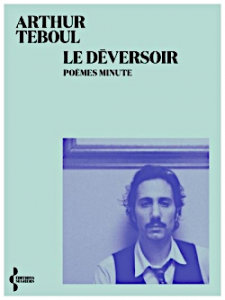 Comme chanteur, Arthur Teboul incarne un esprit rock et romantique, entre popanglo-saxonne (Radiohead) et chanson française (Ferré, Gainsbourg, Bashung), entre ambiance feutrée d’un jazz club et néons perçants d’une scène underground ; poétique et inspiré, il est de ces nouvelles voix talentueuses qui parlent à la jeunesse et, brouillant les frontières habituelles entre les genres, redéfinissent de manière originale et séduisante la scène musicale en France.
Comme chanteur, Arthur Teboul incarne un esprit rock et romantique, entre popanglo-saxonne (Radiohead) et chanson française (Ferré, Gainsbourg, Bashung), entre ambiance feutrée d’un jazz club et néons perçants d’une scène underground ; poétique et inspiré, il est de ces nouvelles voix talentueuses qui parlent à la jeunesse et, brouillant les frontières habituelles entre les genres, redéfinissent de manière originale et séduisante la scène musicale en France.
Auteur des paroles du groupe (des paroles au caractère quasiment visionnaire, qui marquent par leur capacité à saisir l’air du temps), Arthur Teboul confesse qu’il est venu à la musique par la littérature. Il plaide pour une existence où la poésie aurait une plus grande part. On devine facilement qu’il porte en lui la dimension d’un écrivain.
De fait, entre les phases d’écriture des chansons de ses albums, il a pris l’habitude de composer ce qu’il appelle des poèmes minute, lors de séances de ” déversement ” ou d’écriture automatique. Entre le poème en prose et le récit onirique, ce sont de courts textes dont les idées et les émotions seraient les protagonistes, riches en inventions, pleins de mystère, de vivacité, de drôlerie, d’étrangeté et de beauté. Ils composent ce recueil, Le Déversoir.
Arthur Teboul est le chanteur de Feu! Chatterton. Après le succès de l’album Palais d’Argile et de son single Un monde nouveau qui lui ont valu trois nominations aux Victoires de la musique en 2022 (meilleur artiste masculin, meilleur album, meilleure chanson), le groupe a sillonné la France. Une impressionnante tournée couronnée de trois disques d’or, quis’est conclue par trois Olympia à guichet fermé. Le Déversoir est son premier recueil de poésie.
Auteur: Arthur Teboul
Poésie
Le Déversoir – Poèmes minute
Editeur: Seghers
Paru le 16 mars 2023
EAN 9782232146626
ISBN 2232146626
Nombre de pages: 256
Format 14cm x 19cm
Broché
€ 18,00
• fleursdumal.nl magazine
More in: # Music Archive, #Editors Choice Archiv, - Book News, - Bookstores, Archive S-T, Archive S-T, Thomas Chatterton

For the Marriage of
Faustus and Helen
“And so we may arrive by Talmud skill
And profane Greek to raise the building up
Of Helen’s house against the Ismaelite,
King of Thogarma, and his habergeons
Brimstony, blue and fiery; and the force
Of King Abaddon, and the beast of Cittim;
Which Rabbi David Kimchi, Onkelos,
And Aben Ezra do interpret Rome.”
The Alchemist
I
The mind has shown itself at times
Too much the baked and labeled dough
Divided by accepted multitudes.
Across the stacked partitions of the day–
Across the memoranda, baseball scores,
The stenographic smiles and stock quotations
Smutty wings flash out equivocations.
The mind is brushed by sparrow wings;
Numbers, rebuffed by asphalt, crowd
The margins of the day, accent the curbs,
Convoying divers dawns on every corner
To druggist, barber and tobacconist,
Until the graduate opacities of evening
Take them away as suddenly to somewhere
Virginal perhaps, less fragmentary, cool.
There is the world dimensional
for those untwisted
by the love of things irreconcilable . . .
And yet, suppose some evening I forgot
The fare and transfer, yet got by that way
Without recall,–lost yet poised in traffic.
Then I might find your eyes across an aisle,
Still flickering with those prefigurations–
Prodigal, yet uncontested now,
Half-riant before the jerky window frame.
There is some way, I think, to touch
Those hands of yours that count the nights
Stippled with pink and green advertisements.
And now, before its arteries turn dark
I would have you meet this bartered blood.
Imminent in his dream, none better knows
The white wafer cheek of love, or offers words
Lightly as moonlight on the eaves meets snow.
Reflective conversion of all things
At your deep blush, when ecstasies thread
The limbs and belly, when rainbows spread
Impinging on the throat and sides . . .
Inevitable, the body of the world
Weeps in inventive dust for the hiatus
That winks above it, bluet in your breasts.
The earth may glide diaphanous to death;
But if I lift my arms it is to bend
To you who turned away once, Helen, knowing
The press of troubled hands, too alternate
With steel and soil to hold you endlessly.
I meet you, therefore, in that eventual flame
You found in final chains, no captive then–
Beyond their million brittle, bloodshot eyes;
White, through white cities passed on to assume
That world which comes to each of us alone.
Accept a lone eye riveted to your plane,
Bent axle of devotion along companion ways
That beat, continuous, to hourless days–
One inconspicuous, glowing orb of praise.
II
Brazen hypnotics glitter here;
Glee shifts from foot to foot,
Magnetic to their tremulo.
This crashing opera bouffe,
Blest excursion! this ricochet
From roof to roof–
Know, Olympians, we are breathless
While nigger cupids scour the stars!
A thousand light shrugs balance us
Through snarling hails of melody.
White shadows slip across the floor
Splayed like cards from a loose hand;
Rhythmic ellipses lead into canters
Until somewhere a rooster banters.
Greet naively–yet intrepidly
New soothings, new amazements
That cornets introduce at every turn–
And you may fall downstairs with me
With perfect grace and equanimity.
Or, plaintively scud past shores
Where, by strange harmonic laws
All relatives, serene and cool,
Sit rocked in patent armchairs.
O, I have known metallic paradises
Where cuckoos clucked to finches
Above the deft catastrophes of drums.
While titters hailed the groans of death
Beneath gyrating awnings I have seen
The incunabula of the divine grotesque.
This music has a reassuring way.
The siren of the springs of guilty song–
Let us take her on the incandescent wax
Striated with nuances, nervosities
That we are heir to: she is still so young,
We cannot frown upon her as she smiles,
Dipping here in this cultivated storm
Among slim skaters of the gardened skies.
III
Capped arbiter of beauty in this street
That narrows darkly into motor dawn,–
You, here beside me, delicate ambassador
Of intricate slain numbers that arise
In whispers, naked of steel;
religious gunman!
Who faithfully, yourself, will fall too soon,
And in other ways than as the wind settles
On the sixteen thrifty bridges of the city:
Let us unbind our throats of fear and pity.
We even,
Who drove speediest destruction
In corymbulous formations of mechanics,–
Who hurried the hill breezes, spouting malice
Plangent over meadows, and looked down
On rifts of torn and empty houses
Like old women with teeth unjubilant
That waited faintly, briefly and in vain:
We know, eternal gunman, our flesh remembers
The tensile boughs, the nimble blue plateaus,
The mounted, yielding cities of the air!
That saddled sky that shook down vertical
Repeated play of fire—no hypogeum
Of wave or rock was good against one hour.
We did not ask for that, but have survived,
And will persist to speak again before
All stubble streets that have not curved
To memory, or known the ominous lifted arm
That lowers down the arc of Helen’s brow
To saturate with blessing and dismay.
A goose, tobacco and cologne
Three winged and gold-shod prophecies of heaven,
The lavish heart shall always have to leaven
And spread with bells and voices, and atone
The abating shadows of our conscript dust.
Anchises’ navel, dripping of the sea,–
The hands Erasmus dipped in gleaming tides,
Gathered the voltage of blown blood and vine;
Delve upward for the new and scattered wine,
O brother-thief of time, that we recall.
Laugh out the meager penance of their days
Who dare not share with us the breath released,
The substance drilled and spent beyond repair
For golden, or the shadow of gold hair.
Distinctly praise the years, whose volatile
Blamed bleeding hands extend and thresh the height
The imagination spans beyond despair,
Outpacing bargain, vocable and prayer.
Hart Crane
(1889 – 1932)
Recitative
• fleursdumal.nl magazine
More in: Archive C-D, Archive C-D, Crane, Hart
A self-proclaimed “vessel in which stories are told from time immemorial,” poet dg nanouk okpik seamlessly melds both traditional and contemporary narrative, setting her apart from her peers.
 The result is a collection of poems that are steeped in the perspective of an Inuit of the twenty-first century—a perspective that is fresh, vibrant, and rarely seen in contemporary poetics.
The result is a collection of poems that are steeped in the perspective of an Inuit of the twenty-first century—a perspective that is fresh, vibrant, and rarely seen in contemporary poetics.
Fearless in her craft, okpik brings an experimental, yet poignant, hybrid aesthetic to her first book, making it truly one of a kind.
“It takes all of us seeing, hearing, touching, tasting, and smelling to be one,” she says, embodying these words in her work.
Every sense is amplified as the poems, carefully arranged, pull the reader into their worlds. While each poem stands on its own, they flow together throughout the collection into a single cohesive body.
The book quickly sets up its own rhythms, moving the reader through interior and exterior landscapes, dark and light, and other spaces both ecological and spiritual.
These narrative, and often visionary, poems let the lives of animal species and the power of natural processes weave into the human psyche, and vice versa.
Okpik’s descriptive rhythms ground the reader in movement and music that transcend everyday logic and open up our hearts to the richness of meaning available in the interior and exterior worlds.
dg nanouk okpik is a resident advisor at Santa Fe Indian School in New Mexico. Her poetry appears in the books Effigies: An Anthology of New Indigenous Writing, and Sing: Poetry from the Indigenous Americas.
Corpse Whale
by dg nanouk okpik
Publisher: University of Arizona Press
Series: Sun Tracks
Publication Date: October 11th, 2012
Language: English
Paperback
Pages: 112
ISBN: 9780816526741
ISBN-10: 0816526745
$16.95
• fleursdumal.nl magazine
More in: - Book News, - Bookstores, Archive O-P, Archive O-P, Natural history
Thank you for reading Fleurs du Mal - magazine for art & literature